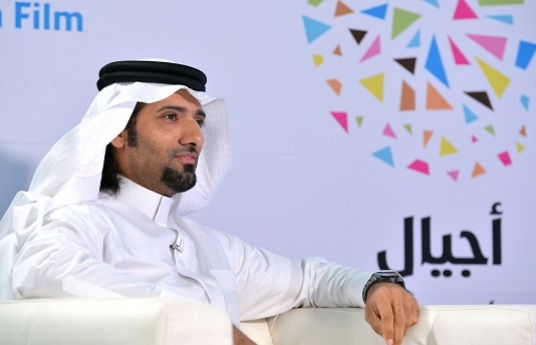Arab filmmakers enthused by feedback of Ajyal Jurors; see festival as springboard for wider industry connections
Dec 04, 2016

Doha, Qatar; December 4, 2016: Arab filmmakers showcasing their films at the fourth Ajyal Youth Film Festival presented by the Doha Film Institute are enthused by the positive response from the young Ajyal Jurors.
“It is not often that you get the opportunity to interact with the jury, and here in Ajyal, meeting with the young juror was important for me as a filmmaker to understand their perception,” says Ely Dagher, whose film Waves’98 (Lebanon) screened in competition in the Bader Shorts Film Programme. The recipient of Doha Film Institute’s Grant, the film won the Palme d’Or with its depiction of the complex relationship of contemporary Beirutis to their troubled home city.
The sentiment was echoed by Faiza Ambah, the director of Mariam (France, Qatar, Saudi Arabia), about the eponymous protagonist who finds her life suddenly becoming very complicated when France passes a law that bans Muslim women from wearing headscarves in public institutions.
Resonating with Ajyal’s themes of women empowerment and positive change, the film made an emotional connection with the audiences, says Faiza. “They were really engaged with the film, and were clapping and laughing.”
She says that the film had to be made because “no one tells our (Arab) story. We do have a voice, and when we have the opportunity, we must tell our story.” Faiza says the decision to bring an underlying humour to the film because she as a filmmaker does not want to see ‘tough films. I want to be entertained. Moreover, Mariam is a young girl who loves life.”
She says the film has helped bring perception shifts about Muslims, and puts forth the message that women empowerment is really about the freedom to exercise one’s choice.
Saudi filmmaker Mohammed Salman was pleasantly surprised with the informed comments from the Ajyal Jurors to the screening of his film Yellow (Saudi Arabia) about the personal relationships that long-term taxi drivers in Dammam have with their vocation.
Ajyal marks the third festival entry for Yellow, and Mohammed says the festival brought the film to a wide young audience. “They asked interesting questions about the film, which shows they had built a relationship with it, and being here at Ajyal helps to reach out to more people in the industry.”
Mohammed says it was always his dream to be a filmmaker, although as a child, watching his father operate films at Saudi Aramco, he thought the director’s role “was to change reels. But that experience put me in touch with the magical world of films.”
He just went out shooting films, with Yellow stemming from a question that he asked himself for a long time. “Why do the taxi drivers keep their yellow cars despite being old and close to unusable? That forced me to go deeper.” He says it is easy to make films in Saudi Arabia and to get official permissions.
Basil Khalil, whose Ave Maria (Palestine, Germany, France), which screened at Ajyal, and was nominated for the Oscars, says it was made to support his submission to the Doha Film Institute to make a full-length feature film. That project A Gaza Weekend is the recipient of the DFI Grant. “DFI is investing in development and post-production, aspects that are the most overlooked by other funding agencies and festivals,” says Basil.
Ave Maria, he says, was almost not made, as it was rejected by most given its quirky comedy. “Comedy is not an easy thing, and perhaps people did not understand why a Palestinian film was not talking about misery and sadness.” He says the biggest challenge was in raising funds for the film, but he wisely invested the interim time in revisiting the script. “Retuning to your script between time-spans gives it a fresh perspective,” says Basil.
On Palestine films making strong inroads at international festivals, Basil says films serves as the only voice left for the community to express their views to the world. “We work under so many restrictions that we feel there is nothing to lose, and it makes us more brave and driven.”
Katara is the Cultural Partner and Oxy Qatar is the Principal Partner for the 2016 edition of the Ajyal Youth Film Festival. Qatar Tourism Authority is the Signature Partner of the festival this year.